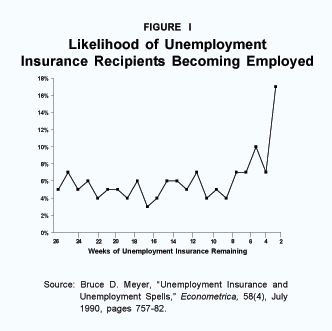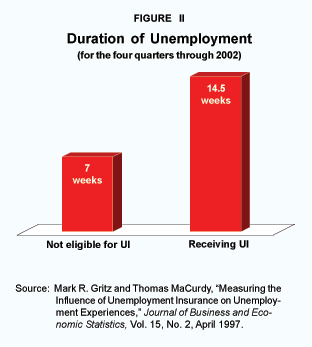A desire to relieve suffering can sometimes hurt. Moving an accident victim can worsen his injuries, despite our good intentions. Similarly, a desire to help the unemployed can actually delay their reemployment.
In most states, regular unemployment insurance (UI) benefits are limited to 26 weeks. In addition, there is an Extended Benefits program which provides up to 13 additional weeks of benefits during periods of high and rising unemployment.
Last year Congress authorized a third program, Temporary Emergency Unemployment Compensation (TEUC), which extended benefits up to an additional 13 weeks beyond the normal Extended Benefits rules. However, this program expired at the end of last year. If Congress can agree on a bill, it is expected to reauthorize the special extended benefits retroactive to December 2002 and bring total coverage to between 39 and 52 weeks, depending on the state.
Instead of extending the program, however, Congress should reconsider the assumptions behind it.
Jobs Are Available
Policy is being made on the fundamentally wrong assumption that the current unemployment rate and the pace of job growth means that jobs are unavailable.
Unemployment grew to 6.0 percent of the labor force (as of November 2002), up from the 4 percent neighborhood in 2000, and net job growth since December 2001 has been zero. Some policy makers assume that people have been laid off and will not be recalled to their previous jobs until job growth resumes.
The reality is quite different. There is no stagnant pool of unemployed who cannot find work until the economy revives. Instead, there are people entering and leaving the job market – some seeking work for the first times in their lives and some retiring or choosing to stay home with their families.
Companies Are Hiring
There are three sources of jobs. Net new job creation is the most widely reported – and is also the smallest. Not only is it the smallest now, it is always the smallest.
The second source of jobs is "churn." In a market economy, there are always new businesses being formed, and some existing businesses are expanding. Other companies are cutting staff or shutting down entirely. At a time when net new job growth is two percent, we are likely to experience a gross gain in new jobs of 12 percent, offset by a gross decline in existing jobs of 10 percent. Job seekers (and policy makers) should focus on the 12 percent gross job creation, not the net gain of two percent. After all, most unemployed people don't much care if their position is a "net" job gain for the economy, or just offsets another job lost elsewhere.
The third source of jobs is the largest: normal turnover. People quit voluntarily for various reasons, including a desire to work at a different job, to go back to school, to have a baby and to retire. Across the economy, the turnover rate is thought to average about 15 percent, with rates as high as 100 percent in sectors that hire entry level workers.
Of course, a lower unemployment rate is desirable. It means unemployed workers will find other jobs with less effort, and personal income will be higher. However, six percent unemployment does not mean there are no jobs.
Jobs Go Begging
Although the federal government does not report total labor turnover, an in-depth Oregon survey offers interesting results. In the 12 months prior to June 2002, the survey found that there were nearly three unfilled jobs for every unemployed Oregon worker collecting UI benefits at some point during that period.
- Oregon had the highest unemployment in the country – every single month – and 206,000 Oregon workers collected UI benefits at some point.
- However, there were an estimated 576,000 job vacancies – more than two jobs for every unemployed worker.
- These unfilled jobs equaled 36 percent of total employment in the state.
Reducing Job Search Efforts
Numerous academic studies have found that unemployment benefits actually harm the unemployed by encouraging less job search effort. For example:
- The likelihood a person receiving UI compensation will find a job more than doubles just before benefit eligibility ends – spiking in the last two weeks. [See Figure I.]
- Workers who are not eligible for UI find jobs more than twice as rapidly as those who are receiving UI. [See Figure II.]
- Prolonging benefits is not the only way UI can extend unemployment; increasing the dollar amount of weekly benefits also lengthens unemployment.
Why do extended UI benefits have this effect? A few workers want to be paid for not working. But for most, the problem is how much effort is put into job search.
For example, laid-off workers waiting to be recalled may not look for work at all. Many are disappointed in the end: the temporary layoff becomes permanent. These people should at least be looking for temporary work during their temporary layoff.
In other cases, people make a few job applications and wait to be called in for an interview. But more effort leads to more rapid reemployment, and a sense of financial need leads to more effort. In short, we really are not helping the unemployed when we lure them into complacency by extending their UI benefits.
Alternatives to Unemployment
What should be done about unemployment? State employment departments should be reoriented. All too often their mission is to process claims and cut checks. Instead, their primary mission should be to help people become self-sufficient. An attitudinal change would encourage the unemployed to actively search for work. There are also structural changes to the federal unemployment tax system which would reduce the tax on jobs, while giving states the ability to better serve the unemployed. It's time to consider such changes. [See, for example, NCPA Brief Analysis # 424, "Chile Leads the Way with Individual Unemployment Accounts."]
But it is not time to extend unemployment benefits. Our economy is naturally resilient, as are our people. Extending UI benefits beyond six months will unreasonably extend unemployment for many Americans.
William Conerly is an economic consultant whose clients include the American Institute for Full Employment. He is also a Senior Fellow of NCPA. He can be reached at Bill@ConerlyConsulting.com